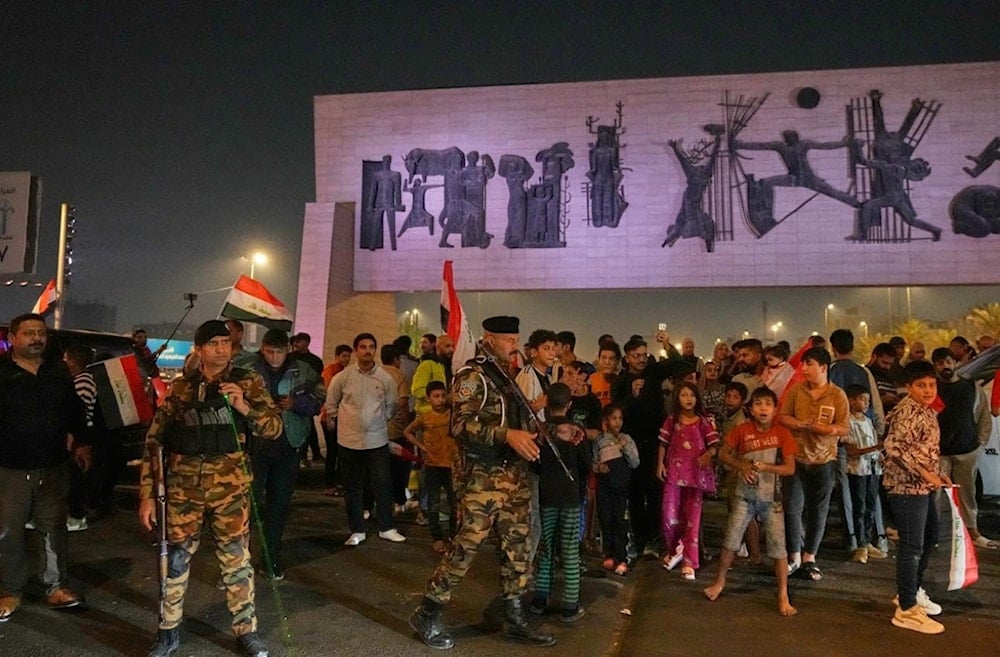Iraq election results: Sudani’s coalition leads with 56% turnout
Iraq’s election commission announced preliminary results with 56.11% turnout, as Sudani’s coalition leads Baghdad, and the KDP dominates the north.
-

Supporters of Iraqi Prime Minister Mohammed Shia al-Sudani cheer in Tahrir Square, Baghdad, Iraq, Wednesday, November 12, 2025 (AP)
Iraq’s Independent High Electoral Commission has released the preliminary results of the country’s parliamentary elections, with nationwide voter turnout reaching 56.11%, reflecting strong participation across several provinces.
Baghdad: Sudani’s coalition leads
In Baghdad, turnout stood at 48.76%, where Prime Minister Mohammad Shia al-Sudani’s Reconstruction and Development Coalition secured first place. The Taqaddum Party, led by former Parliament Speaker Mohammad al-Halbousi, ranked second, followed by Nouri al-Maliki’s State of Law Coalition in third place. The National State Forces Alliance came in fourth.
Northern provinces: Kurdish dominance
In Nineveh, participation reached 65.09%, with the Kurdistan Democratic Party (KDP) leading the results, followed by Taqaddum and Reconstruction and Development. In Erbil, voter turnout was the highest in the country at 71.65%, with the KDP again taking first place.
Meanwhile, in Duhok, the KDP continued its dominance with 77.47% turnout, securing first place across the province. The Patriotic Union of Kurdistan (PUK) led in Sulaymaniyah, where turnout reached 60.15%.
Southern Iraq: shifting alliances
In Basra, voter participation reached 51.03%, with the Tasmeem Alliance leading, followed by the Al-Sadiqoon Movement. The Reconstruction and Development Coalition ranked third, State of Law fifth, and National State Forces Alliance sixth.
In Qadisiyyah, turnout was 49%, with Reconstruction and Development first, State of Law second, and the Badr Organization third. The Al-Sadiqoon Movement and National State Forces Alliance followed in fourth and fifth place, respectively.
In Karbala, turnout was 47.59%, with Reconstruction and Development in first place and State of Law in second. Wasit recorded 47.52% turnout, with Wasit is More Beautiful with Services leading, followed by State of Law and Reconstruction and Development.
In Muthanna, where turnout was 50.70%, Reconstruction and Development ranked first, followed by State of Law, Al-Sadiqoon, and National State Forces Alliance. In Maysan, Reconstruction and Development also topped the results with 42.15% participation, followed by Badr, State of Law, Al-Sadiqoon, and National State Forces.
Western and central Iraq: strong turnout
In Anbar, turnout was 66.59%, with Taqaddum leading and Anbar Is Our Identity taking second place. In Salah al-Din, participation stood at 66.98%, with Taqaddum first, Reconstruction and Development second, and Azm al-Iraq third.
In Najaf, turnout was 43.62%, where Reconstruction and Development came first and National State Forces second. State of Law ranked fourth and Al-Sadiqoon fifth.
The Electoral Commission said the results remain preliminary and subject to appeals and manual reviews before final certification. The figures highlight Iraq’s complex political mosaic, marked by regional diversity — with Shia-led coalitions prevailing in the south, Sunni blocs performing strongly in the west, and Kurdish parties dominating the north.
Analysts say the final seat allocations will shape coalition talks to form the next government under Prime Minister Mohammad Shia al-Sudani’s leadership, amid calls for reform, stability, and renewed national unity.
Iraq concludes voting
Iraq completed the general voting phase of the 2025 parliamentary elections on Tuesday, as polling stations closed across all provinces at 6 p.m. local time. This followed the special voting round held earlier this month on November 9, during which members of the security forces cast their ballots.
The elections determine the composition of Iraq’s 329-seat Council of Representatives, a process that has taken place regularly since 2005. Officials reported that the voting proceeded under standard security and monitoring measures, with no major disruptions recorded during the day.
Prime Minister Mohammed Shia al-Sudani praised the electoral process, describing it as a step that reflects the will of the Iraqi people and their pursuit of stability. He said the completion of the elections represents the government’s fulfillment of one of its primary commitments under its executive agenda.

 4 Min Read
4 Min Read










